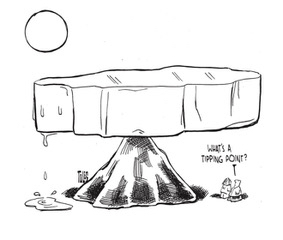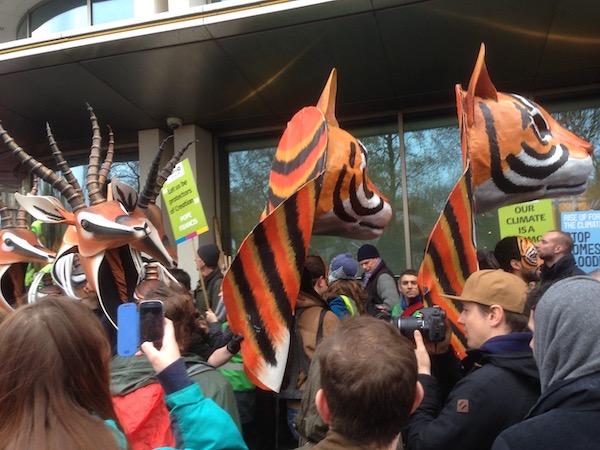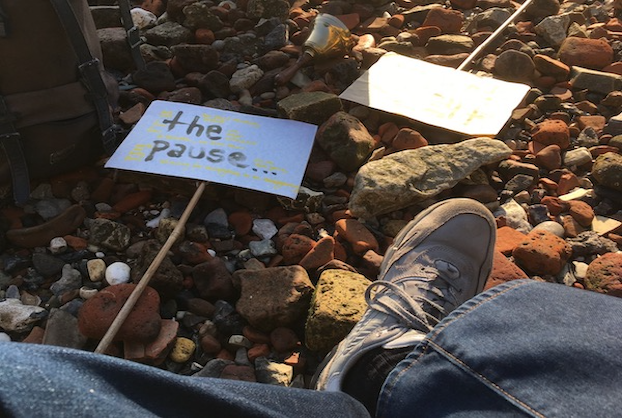It is not about wrestling with the controls of economics to force it in the direction of degrowth, but about getting ready for the moment when the coming climacteric does the heavy work of degrowth for us. David Fleming1
This article is an exploration of this strange time through which we are living. Author and green economist, David Fleming invokes a climacteric. Dictionaries offer a variety of meanings including: an expectable decline of a fossil-fuelled civilisation, a critical period or tipping point that has far reaching implications and the loss of a culture’s fertile creativity. The ambiguity inherent in David Fleming’s use of the climacteric is very relevant to apprehending the challenges within our Western culture that parallel the shift out of a stable Holocene epoch. Descriptors and metaphors such as the Anthropocene, the Great Turning, the Apocalypse, Catastrophic Climate Change, the End of Nature, the End of Capitalism, the End of the World as we know it; all mark this transit.

'What's a tipping point?' Image credit Tom Toles
It is a critical period that marks the decline of what has fuelled our capitalist growth and possibly our cultural inspiration. Fleming suggests it is about getting ready for the moment, a climatic moment. Such fateful moments are envisaged by Rilke in ‘Remembering’2
And you wait. You wait for the one thing
that will change your life
Like in shamanic initiations, such moments of awakening out of a dissociated half-life are often preceded by a crisis of health, betrayal or abandonment. An ‘accident’ happens that has far reaching implications and makes it impossible to return to the previous existence. These are climacteric. Pivotal moments in which some other force seems to redirect our lives.
Or not. If the dissociation is severe enough, we limp on to the next crisis. And they are coming; financial crash, Covid pandemic, energy crisis, cost of living, threat of artificial intelligence becoming smarter than human. Climate disturbances such as earthquakes, fires, floods, storms, ice melt, sea level rise - against these our culture has psycho-social defences that help the disavowal, such as distractive entertainment and short attention spans. Trivial pursuits as distractors are sometimes blamed by activists for too few being out on the streets. This has some truth and distractions also operate as centrifugal dissipators of anxiety, fear and frustration. We ‘do’ and feel better. We have pressing things to do that can’t be kept waiting. Yes the floods are terrible and I must get to the sales.
The psychological work is to stay with these disturbing feelings. Donna Haraway, author of Staying with the Trouble3, writes,
In urgent times, many of us are tempted to address trouble in terms of making an imagined future safe, of stopping something from happening that looms in the future, of clearing away the present and the past in order to make futures for coming generations. Staying with the trouble does not require such a relationship to times called the future. In fact, staying with the trouble requires learning to be truly present, not as a vanishing pivot between awful or endemic pasts and apocalyptic or salvific futures, but as mortal critters entwined in myriad unfinished configurations of places, times, matters, meanings.
Learning to be truly present is a strongly counter-cultural practice. From early infancy, escape to promised futures - the sweets, the TV, the game, the holiday – is the bribe to endure the present discomfort. And when the unspeakable collective dread approaches, not just no economic growth but de-growth, few see through the political spin, the web of illusion that promotes ‘sustainable growth’. Brought up on a social diet of comfort and hope of things getting better, there is little appetite to face into difficult truths such as our whole economic model being based on the delusion of infinite growth on a finite planet.
A few years ago, there seemed to be a shift in the cultural narrative. The main climate deniers were in retreat as both the science of climate and the direct evidence of climate disasters became foreground in the news. But ‘climate’ had become the new buzzword and commodification of climate solutions and greenwashing became the new sales pitch. It is very upsetting when your own words are stolen and twisted to be cleverly used against any substantial change. It is no longer that sullen silence of denial that greets the climate crisis topic but the assurance of assimilation. “We can carry on as we are, saved from terrifying collapse”.
The really challenging crisis is not carbon or even climate disturbance but attachment to our privileged western way of living. The failures of banks, health, travel and food are apparent. It is no wonder that people are anxious, and what is even more worrying is that nobody knows what to do. Some are planning escapes on ‘life rafts’ to remote locations where they will supposedly be less dependent on local services and safe from desperate refugees. Futurists are imagining armed gangs defending what is theirs.
Our compliant domestication has made us reliant on a complex support system that offers great safety and convenience but is also precarious, as we discovered in the Covid pandemic. We seem culturally to be at an impasse. No solutions, no saviours, only an abject sense of hopelessness that some fight to overcome. Something different is needed. Between the resignation to passive futility and the active fighting for a more just world, is there a third alternative?
What the climacteric metaphor offers is the potential not to defend but to let come. Philosophically and psycho-spiritually this letting-come is associated with an acceptance and surrender that comes after a period of struggle. Recognising that the problem is insoluble allows it to be seen as a dilemma, an existential predicament that confounds the personal ego. At a cultural level the climate crisis can be recognised as just such a dilemma.

Image Credit: Chris Robertson
Therapists often encourage a letting go process as a release from unnecessary burden and stress. The complement of this is letting come - an acceptance and trust in an unfolding process even when the outcomes are unknown and potentially painful. Fleming’s encouragement is to wait for (and trust) the climacteric to do the heavy work of degrowth. The difficulty with letting come in relation to culturally embedded mistrust is collective trauma that affects the whole society4. This operates to trigger levels of defensive hypervigilance that protect against the dreaded nothingness and keep the mistrust foregrounded. While these defences are established to avoid any possible re-traumatising, they act to prevent potential opening.
Letting come may be different. It is the inverse of the western fixation with solving problems. Instead of attempting to fix the threads of institutional failure, the falling apart of conventions and derangement of cultural values, it invites a pause. A shift from activist engagement to receptivist engagement. These pauses can feel awkward, hesitant; full of unknowing.
In November 2018, I attended a collective pause organised by Toni Spencer on one of the London bridges that XR were occupying. This was a “simple structure to enable moments of pausing within the mass actions, to reconnect, ground and bear witness in the midst of it all”. It involved a listening for the moment – an increase in frenzy, a troubled noise – that indicates a shift. A bell was rung accompanied by other bells all calling for a few seconds of silence. Stop; bear witness, breathe. . . reconnect.
Naturally not everyone on the bridge cooperated at first but once it was recognised as a moment of aware reconnection, it caught on. We were being present to the moment. And trusting the bells to alert us to that moment – a mini climacteric.
Footnotes
1. Fleming, D. (2016: 189). Lean Logic: A Dictionary For The Future & How To Survive It, Chelsea Green.
2. A year with Rilke: daily readings from the best of Rainer Maria Rilke. Barrows, A & Macy, J (2009: 86) Collins; New York
3. Haraway, D (2016: 1) Staying with the Trouble: Making Kin in the Chthulucene. Duke uni. London
4. Bednarek, S (2021) Climate change, fragmentation and collective trauma
Chris Robertson: psychotherapist and trainer since 1978, ex-CPA Chair, co-founder of Re-Vision and contributor to Depth Psychology and Climate Change and A Matter of Life and Death. https://www.culture-crisis.net


